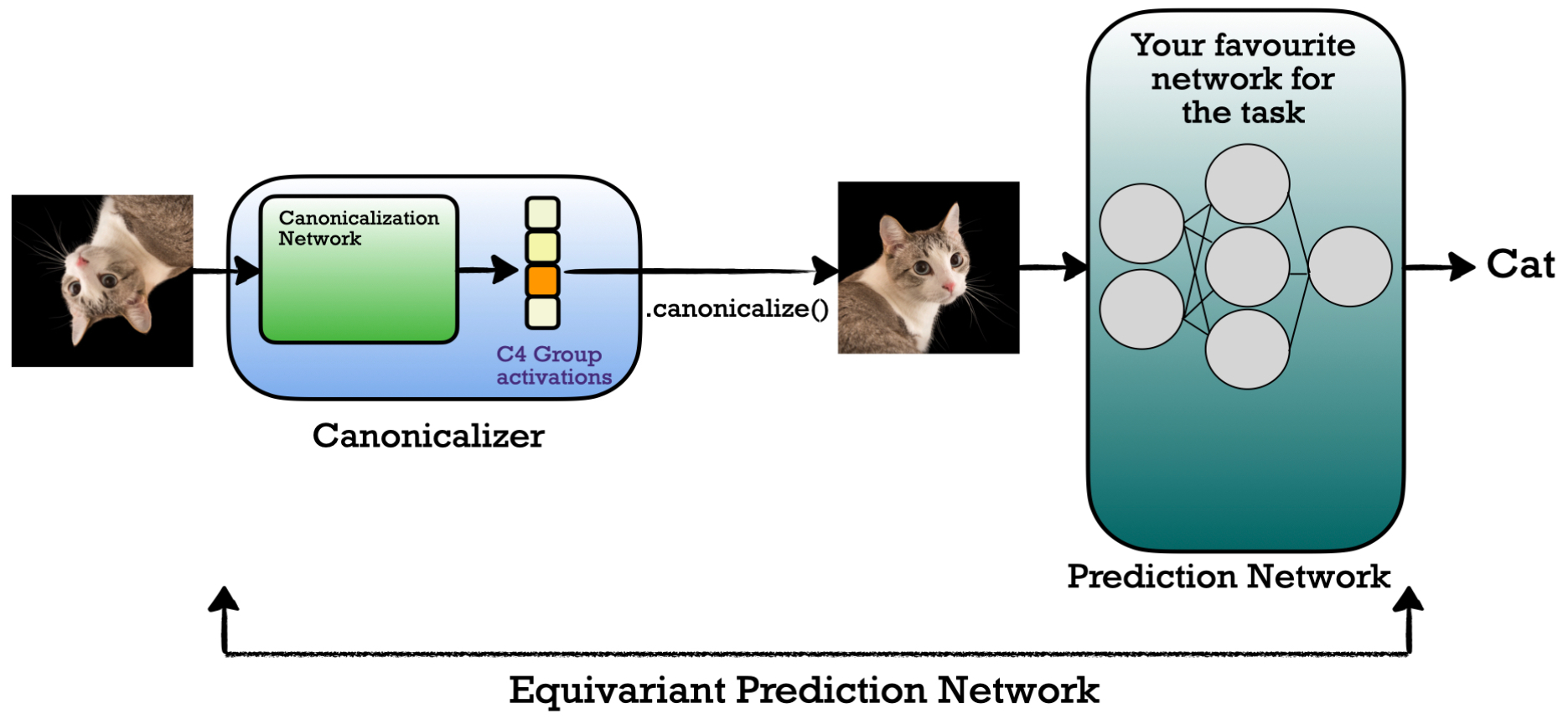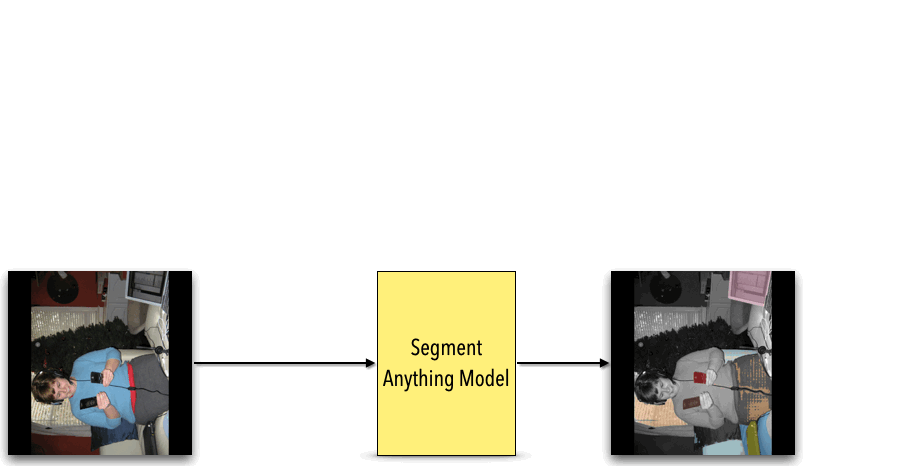EquiAdapt is a PyTorch package that provides a flexible and efficient way to make any neural network architecture (including large foundation models) equivariant, instead of redesigning and training from scratch. This is done by learning to canonicalize transformed inputs, before feeding them to the prediction model. You can play with this concept in the provided tutorial for equivariant adaptation of the Segment-Anything Model (SAM, Kirillov et. al, 2023) and images from Microsoft COCO (Lin et. al, 2014) dataset for instance segmentation.
To learn more about this from a blog, check out: How to make your foundation model equivariant
Read more about this here
Read more about this here
Equiadapt enables users to obtain equivariant versions of existing neural networks with a few lines of code changes:
import torch
import torch.nn.functional as F
+ from equiadapt.images.canonicalization.discrete_group import GroupEquivariantImageCanonicalization
+ from equiadapt.images.canonicalization_networks import ESCNNEquivariantNetwork
device = torch.device("cuda" if torch.cuda.is_available() else "cpu")
+ canonicalization_network = ESCNNEquivariantNetwork(...) ### create a canonicalization network
+ canonicalizer = GroupEquivariantImageCanonicalization(canonicalization_network, ...) ### wrap it using equiadapt's canonicalization wrapper
model = torch.hub.load('pytorch/vision:v0.10.0', 'resnet50', pretrained=True).to(device)
optimizer = torch.optim.Adam(model.parameters())
train_dataset = datasets.CIFAR10(root="dataset_path", train=True, download=False)
train_loader = torch.utils.data.DataLoader(train_dataset, batch_size=512, shuffle=True)
model.train()
for epoch in range(100):
for inputs, targets in data:
inputs = inputs.to(device)
targets = targets.to(device)
optimizer.zero_grad()
+ inputs_canonicalized = canonicalizer(inputs) ### canonicalize the inputs
outputs = prediction_network(inputs_canonicalized) ### pass the canonicalized input data
+ outputs = canonicalizer.invert_canonicalization(outputs) ### optional (if you to invert the outputs for your equivariant task)
loss = F.cross_entropy(outputs, targets)
+ loss += canonicalizer.get_prior_regularization_loss() ### prior regularization is recommended for pretrained networks
loss.backward()
optimizer.step()- Create a
canonicalization network(or use our provided networks: for images, inequiadapt/images/canonicalization_networks/).
canonicalization_network = ESCNNEquivariantNetwork(...)
- Wrap it using
equiadaptwrappers to form acanonicalizer.
To create your custom canonicalizer, you must inherit BaseCanonicalization and define canonicalize() and, optionally, invert_canonicalization(). Please refer to this for custom image canonicalizers.
canonicalizer = GroupEquivariantImageCanonicalization(canonicalization_network, ...)
- Use this wrapper with your code to canonicalize the input data.
inputs_canonicalized = canonicalizer(inputs)
- Define your prediction network and pass the canonicalized input data
prediction_network = torch.hub.load('pytorch/vision:v0.10.0', 'resnet50', pretrained=True)
outputs = prediction_network(inputs_canonicalized)
- Optionally, if required, you can "invert" the canonicalization for equivariant tasks
outputs = canonicalizer.invert_canonicalization(outputs)
- The entire setup is end-to-end trainable. Additionally, you can use
.add_prior_regularizer(loss)to use prior regularization, which is helpful for equivariant adaptation of large pretrained models (Mondal et. al, 2023)
loss = CrossEntropyLoss(outputs, y)
loss = canonicalizer.add_prior_regularizer(loss)
loss.backward()
You can install the latest release using:
pip install equiadapt
You can clone this repository and manually install it with:
pip install git+https://github.com/arnab39/equiadapt
The recommended way is to manually create an environment and install the dependencies from the min_conda_env.yaml file.
To create a conda environment with the necessary packages:
conda env create -f conda_env.yaml
conda activate equiadapt
pip install -e .
We've noticed that the above command to install the dependencies from conda_env.yml may take very long. A faster way to install the required packages is (should take 5-10 mins):
conda env create -f min_conda_env.yaml
Note that this might not be a complete list of dependencies. If you encounter any issues while running examples, please add the required dependencies from conda_env.yaml and create a pull request.
We provide examples to run equiadapt in different data domains and tasks to achieve equivariance.
- Image:
- Point Cloud:
- Nbody Dynamics: Link
Our examples use hydra to configure hyperparameters. Follow the hydra setup instructions to create a .env file with the paths to store all the data, wandb logs and checkpoints.
Create a .env file in the root of the project with the following content:
export HYDRA_JOBS="/path/to/your/hydra/jobs/directory"
export WANDB_DIR="/path/to/your/wandb/jobs/directory"
export WANDB_CACHE_DIR="/path/to/your/wandb/cache/directory"
export DATA_PATH="/path/to/your/data/directory"
export CHECKPOINT_PATH="/path/to/your/checkpoint/directory"
You can also find tutorials on how to use equiadapt with minimalistic changes to your own code.
For more insights on this library refer to our original paper on the idea: Equivariance with Learned Canonicalization Function (ICML 2023) and how to extend it to make any existing large pre-trained model equivariant: Equivariant Adaptation of Large Pretrained Models (NeurIPS 2023). An improved approach for designing canonicalization network, which allows non-equivariant and expressive models as equivariant networks is presented in Improved Canonicalization for Model Agnostic Equivariance (CVPR 2024: EquiVision Workshop).
If you find this library or the associated papers useful, please cite the following papers:
@inproceedings{kaba2023equivariance,
title={Equivariance with learned canonicalization functions},
author={Kaba, S{\'e}kou-Oumar and Mondal, Arnab Kumar and Zhang, Yan and Bengio, Yoshua and Ravanbakhsh, Siamak},
booktitle={International Conference on Machine Learning},
pages={15546--15566},
year={2023},
organization={PMLR}
}
@inproceedings{mondal2023equivariant,
author = {Mondal, Arnab Kumar and Panigrahi, Siba Smarak and Kaba, Oumar and Mudumba, Sai Rajeswar and Ravanbakhsh, Siamak},
booktitle = {Advances in Neural Information Processing Systems},
editor = {A. Oh and T. Neumann and A. Globerson and K. Saenko and M. Hardt and S. Levine},
pages = {50293--50309},
publisher = {Curran Associates, Inc.},
title = {Equivariant Adaptation of Large Pretrained Models},
url = {https://proceedings.neurips.cc/paper_files/paper/2023/file/9d5856318032ef3630cb580f4e24f823-Paper-Conference.pdf},
volume = {36},
year = {2023}
}
@inproceedings{
panigrahi2024improved,
title={Improved Canonicalization for Model Agnostic Equivariance},
author={Siba Smarak Panigrahi and Arnab Kumar Mondal},
booktitle={CVPR 2024 Workshop on Equivariant Vision: From Theory to Practice},
year={2024},
url={https://arxiv.org/abs/2405.14089}
}
For questions related to this code, please raise an issue and you can mail us at:
arnab.mondal@mila.quebec
siba-smarak.panigrahi@mila.quebec
kabaseko@mila.quebec
You can check out the contributor's guide.
This project uses pre-commit, you can install it before making any
changes::
pip install pre-commit
cd equiadapt
pre-commit install
It is a good idea to update the hooks to the latest version::
pre-commit autoupdate



